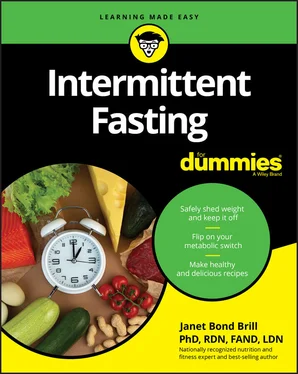1 ...8 9 10 12 13 14 ...17  Considering calories
Considering calories
 Figuring out your calorie math
Figuring out your calorie math
 Deciphering your calories in
Deciphering your calories in
 Coming to terms with your calories out
Coming to terms with your calories out
Calories … you hate them, you don’t want to hear about them, and you certainly don’t want to count them. You may even be a bit taken aback by a discussion of calories when you thought intermittent fasting didn’t count calories. After all, intermittent fasting is about when you eat, not so much about what you eat, right? Yes and no. The beauty and simplicity of intermittent fasting plans lie in the focus more on timing rather than the nuisance of counting calories.
It’s up to you: You can immediately skip this chapter, or you can instead use this chapter as your backup tool kit to refer to if your intermittent fasting plan is not giving you the results that you had hoped for. Or, perhaps, you’re just interested in calories.
This chapter is a tool to help you grasp the concept of weight loss and the role calories play in losing and gaining weight. If one of your intermittent fasting goals is to lose weight and body fat, then the following illustrates why intermittent fasting works.
Examining How Your Intermittent Fasting Plan Is Going
People who try intermittent fasting and fail, lament that it doesn’t work. The overwhelming reason why intermittent fasting doesn’t give results for these people is because they use their fasting windows as a license to eat anything and everything they want. Bottom line: They eat too many calories during their eating windows, an action that will prevent weight loss and perhaps even promote weight gain. If you find yourself in the same situation, then press your panic button and do the calorie calculations in this chapter to see what and where you’re overeating and/or underexercising. What I can tell you from my years of experience helping people lose weight is that 99.9 percent of people underestimate the amount of food they eat.
 Intermittent fasting isn’t a diet, but a pattern of eating. More specifically, it’s a lifestyle that you can sustain for a lifetime. The key to not feeling deprived is to think of it as a marathon, not a sprint. Familiarizing yourself with the calorie math can help you to instinctively recognize when you’re overeating without getting out a calculator.
Intermittent fasting isn’t a diet, but a pattern of eating. More specifically, it’s a lifestyle that you can sustain for a lifetime. The key to not feeling deprived is to think of it as a marathon, not a sprint. Familiarizing yourself with the calorie math can help you to instinctively recognize when you’re overeating without getting out a calculator.
Never fear! I don’t advise counting your calories each day, each week, or each month. I do encourage you to do the occasional calorie calculations to make yourself more aware of what you’re eating. Knowing this information can help you make better choices around food and meal selection during your eating windows as well as help you reach your weight and fat loss goals.
The next few sections take you on a whirlwind science exploration tour — the laws of physics (simplified). The goal is to clarify the misinformation that you may have been bombarded with regarding the basis for all things weight related (both weight gain and weight loss).
Explaining calorie surplus and deficit
Search for “calories and weight loss” online, and you’ll find: “Not all calories are equivalent. “A calorie may not be a calorie.” “A calorie is of course a calorie.” As you can see, a lot of information is out there about the role calories play in weight loss.
LOOKING TO PHYSICS TO EXPLAIN CALORIES
In an effort to clarify the calorie science, this calls for a refresher on Sir Isaac Newton’s laws of physics to help you understand calorie deficit. Newton’s first law of thermodynamics (in physics) is the law of conservation of energy. This states that energy can’t be created or destroyed in a closed system. Translation: If the calories in the foods you consume (even those foods you may consider to be clean) are more than the calories you burn (your resting metabolic rate and all your activity in a day), you’re creating a daily calorie surplus and you’re going to gain weight (fat). Simple. What about the other way around? If you eat fewer calories than you expend and create a daily calorie deficit, you’ll lose weight.
 The following two terms are important when talking about calories and weight loss:
The following two terms are important when talking about calories and weight loss:
Calorie surplus: You eat more calories than you expend and create a daily calorie surplus, you gain weight.
Calorie deficit: You eat fewer calories than you expend and create a daily calorie deficit, you lose weight.
All diets — regardless of macronutrient (carbs, fat, and protein) percentage (low-carb, low-fat, Paleo, vegan, Mediterranean, or even intermittent fasting plans) — work through creating a calorie deficit. If you don’t create a calorie deficit, you don’t lose weight. If you create too great a calorie deficit, you lose muscle mass and your metabolic rate drops (yikes!).
It’s a balancing act, create the deficit, just not too much. Anyone who argues against the fundamental role of energy balance in weight regulation — against calories in versus calories out — is practicing an exercise in futility.
Even though it’s a fact that calories in versus calories out is the law, it’s equally true that the number of calories required to lose weight or maintain weight or gain weight differs from person to person. That’s because the calories required for each person vary widely and are influenced by numerous factors not under a person’s control such as genetics.
What’s also true is not all calories are created equally. There is a difference in the number of calories your body requires to burn and digest each of the three macronutrients: protein, carbs, and fat —scientifically termed the thermic effect of food. Protein has the highest thermic effect of the three macronutrients, but the increase in metabolic rate from eating protein (and therefore its contribution to weight loss) is negligible. The great thing about eating protein when intermittent fasting is that protein is the most filling of the macronutrients. Eating protein helps curb your appetite — a welcome addition to any weight-loss plan.
 Forget the marketing hype and fad diet gimmicks. When it comes to losing weight, eat fewer calories and burn more calories, and over time you will lose weight.
Forget the marketing hype and fad diet gimmicks. When it comes to losing weight, eat fewer calories and burn more calories, and over time you will lose weight.
When you cut down on your intake of one macronutrient (whether it’s carbs or fat — both popular fad diet strategies), or you restrict yourself from eating for 16 hours in a particular day (such as the 16:8 intermittent fasting plan), your total calories consumed for that day will be lower than what you would have eaten on a typical day in your pre-fasting life. This action creates a calorie deficit — the all-important basis for weight loss.
Читать дальше

 Considering calories
Considering calories Intermittent fasting isn’t a diet, but a pattern of eating. More specifically, it’s a lifestyle that you can sustain for a lifetime. The key to not feeling deprived is to think of it as a marathon, not a sprint. Familiarizing yourself with the calorie math can help you to instinctively recognize when you’re overeating without getting out a calculator.
Intermittent fasting isn’t a diet, but a pattern of eating. More specifically, it’s a lifestyle that you can sustain for a lifetime. The key to not feeling deprived is to think of it as a marathon, not a sprint. Familiarizing yourself with the calorie math can help you to instinctively recognize when you’re overeating without getting out a calculator. The following two terms are important when talking about calories and weight loss:
The following two terms are important when talking about calories and weight loss:










